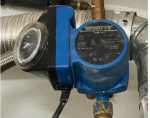I don't plan to do any winter camping but sometimes at Altitude the temps do dip down well below freezing... I have been trying to figure a way to keep my water pump and the fresh water tank that is below the floor in my trailer from freezing... At home I use a very small pump to recirulate hot water through out pipes so we don't have to run a lot of water before it is hot... Water is like gold here in San Diego... see pic... was wondering if something like that might work in the trailer... it would take a bit of power and LP gas to heat the water which doesn't sound like a winner but not sure what other options there may be... What do you do ?
Thanks
Thanks



